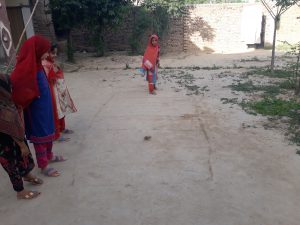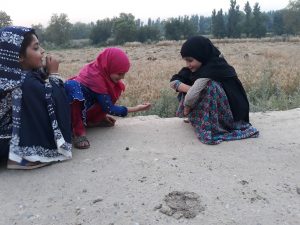
It was early in the morning when I came out of home and saw some little girls playing traditional games called “Cheendro” and “Meergati” – once considered two of the best and most frequently played games in the Pashtun Belt for centuries.
However, these games have been ignored or replaced by the others after losing popularity among girls in the present era.

A girl Huma said, “When we were teenagers in late 90s, we used to play these games but the times have changed and in the current era no mother is ready to let her daughter outside to play such folk games because of the insecurity in society.”
She says these were not only games but also a chance for all the girls to have a good interaction and to know what was going on around in the society.

Explaining the indigenous game Cheendro, she said, “This is a game played by the girls alone as it is considered to be a feminine sport. Cheendro is actually the name of a diagram, which is like a rectangle shape and is drawn down on the ground or floor by chalk or a stone.”
She further elaborated that Cheendro was played between two teams each consisting of three to four members.
According to Huma, there is a much difference between the present era girls and them because they were socially sound thanks to playing such games outside home. But the girls are now confined to their homes.
And they are not playing such physical games even indoors which, Huma thinks, was very important.
Hijab Gul, a primary school student, have never played Cheendro or Meergati because these games were to be played with many other girls in streets or open spaces and her mother never wanted to let her out of home due to insecure environment and conservative society.
Many experts claim that the modern technology is the sole murderer of the traditional games because most of the youngsters remain busy using mobile or opt to computer games.
Ayesha, a mother of three, said, “I have played many tournaments of Meergati and used to play it in school, home and streets along with other friends, but now I don’t see any girl playing this game because their parents are not willing to let their daughters go outside.”
Ayesha says the society was very different when she was a school girl and there were no such issues which could constrain them from outdoors, but cases related to child rape or kidnapping have made the situation worrying and that was why for most of the time they kept their children inside their homes.
Explaining Meergati, she said, “This is too a game of little girls. In this game round pebbles, which are five in number, are taken and played by four individuals turn by turn. One of the pebbles is tossed in the air and the other pebbles are hastily collected in a hand before it comes to the ground and the tossed pebble is caught by the same hand.”
If someone drops the pebbles her turn is gone, she added.
She asked the government to take steps to revive the traditional games and encourage the girls to play these because it will be a good step towards women empowerment too.
Khan Zaman Kakar, an Anthropology PhD scholar, considers three factors responsible for the decline of these folk games.
The first reason he explains is the “religious extremism” which, according to him, has placed a forced ban on sports and activities of women. As a result, they are now confined to their homes. Similarly, a large number of girls’ schools have been bombed so as to stop them from getting education.
The second reason is the ignorance of state which has turned a blind eye to the traditional games with no safe environment provided for these.
The third reason is the process of globalisation. “Globalisation is equally responsible for the decline of traditional games as they were rural in nature and the large-scale urbanisation has stopped girls from playing these,” he says
He considers mobile technology and internet one of the core reasons for the decline of these games, which are a part of globalisation.
However, these games have been ignored or replaced by the others after losing popularity among girls in the present era.

A girl Huma said, “When we were teenagers in late 90s, we used to play these games but the times have changed and in the current era no mother is ready to let her daughter outside to play such folk games because of the insecurity in society.”
She says these were not only games but also a chance for all the girls to have a good interaction and to know what was going on around in the society.

Explaining the indigenous game Cheendro, she said, “This is a game played by the girls alone as it is considered to be a feminine sport. Cheendro is actually the name of a diagram, which is like a rectangle shape and is drawn down on the ground or floor by chalk or a stone.”
She further elaborated that Cheendro was played between two teams each consisting of three to four members.
According to Huma, there is a much difference between the present era girls and them because they were socially sound thanks to playing such games outside home. But the girls are now confined to their homes.
And they are not playing such physical games even indoors which, Huma thinks, was very important.
Hijab Gul, a primary school student, have never played Cheendro or Meergati because these games were to be played with many other girls in streets or open spaces and her mother never wanted to let her out of home due to insecure environment and conservative society.
Many experts claim that the modern technology is the sole murderer of the traditional games because most of the youngsters remain busy using mobile or opt to computer games.
Ayesha, a mother of three, said, “I have played many tournaments of Meergati and used to play it in school, home and streets along with other friends, but now I don’t see any girl playing this game because their parents are not willing to let their daughters go outside.”
Ayesha says the society was very different when she was a school girl and there were no such issues which could constrain them from outdoors, but cases related to child rape or kidnapping have made the situation worrying and that was why for most of the time they kept their children inside their homes.
Explaining Meergati, she said, “This is too a game of little girls. In this game round pebbles, which are five in number, are taken and played by four individuals turn by turn. One of the pebbles is tossed in the air and the other pebbles are hastily collected in a hand before it comes to the ground and the tossed pebble is caught by the same hand.”
If someone drops the pebbles her turn is gone, she added.
She asked the government to take steps to revive the traditional games and encourage the girls to play these because it will be a good step towards women empowerment too.
Khan Zaman Kakar, an Anthropology PhD scholar, considers three factors responsible for the decline of these folk games.
The first reason he explains is the “religious extremism” which, according to him, has placed a forced ban on sports and activities of women. As a result, they are now confined to their homes. Similarly, a large number of girls’ schools have been bombed so as to stop them from getting education.
The second reason is the ignorance of state which has turned a blind eye to the traditional games with no safe environment provided for these.
The third reason is the process of globalisation. “Globalisation is equally responsible for the decline of traditional games as they were rural in nature and the large-scale urbanisation has stopped girls from playing these,” he says
He considers mobile technology and internet one of the core reasons for the decline of these games, which are a part of globalisation.
